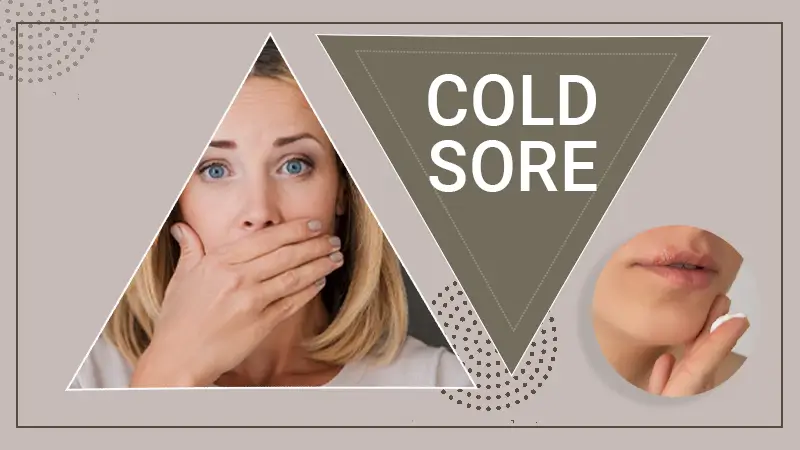
According to the American Dental Association (ADA), cold sores, sometimes known as fever blisters, come from the herpes simplex virus type 1 (HSV-1).
Symptoms of cold sores can be frustrating but easily manageable with the proper cold sore treatment. Usually, painful blisters form around the mouth, but when you get a cold sore, do you get a fever?
Cold sores have been called fever blisters because they often appear after someone has a fever. Symptoms of cold sores occur in stages, with the blisters forming within 24 hours of infection. Surprisingly, some people can have the herpes virus but don’t form cold sores or show any symptoms.
Keep reading to learn more about the connection between cold sores and fever.
When You Get A Cold Sore, Do You Get a Fever?
Most likely. Fever and flu-like symptoms of cold sores occur in the second stage of infection. Once the blisters form around the mouth, having a fever indicates that you got the herpes simplex virus type 1.
But what’s a fever?
Fever is also called hyperthermia, pyrexia, or high temperature. It refers to a body temperature that’s higher than usual. Adults and kids can get a fever.
A fever is a symptom of illness in your body. Fever causes the body to have a temperature of 38°C or higher. Usually, the body’s normal temperature is 36-37°C depending on the person’s age, time of day, how you take the measurement, and current activity.
Nonetheless, a short-term elevated body temperature enables your body to fight off illness. But when the fever is severe, it’s usually a symptom of a serious incoming condition that needs immediate medical attention.
When it comes to a fever caused by a cold sore, you’re likely to have accompanying symptoms like headache, shivering, sweating, muscle or gland aches, general body weakness, and loss of appetite.
Fortunately, even cold sore treatments over the counter can cure the fever and other symptoms. But when the symptoms persist, like unending severe headaches, throat swelling, and more blisters, you should consult your doctor immediately.
How to Treat Cold Sore Fever At Home
Treating a fever depends on its severity. A mild fever without other symptoms is likely to go away. The best approach would be to drink enough fluids and sleep or rest as it fades away.
Take the following steps to treat the fever at home;
- Use a thermometer to take your temperature while assessing the accompanying symptoms.
- Take time off work and rest.
- Stay hydrated. Fever causes severe sweating, so drink a lot of water, iced tea, or energy drinks to recover fluids lost through sweating. If you find it hard to drink anything, you can suck on ice chips.
- Take fever medications like ibuprofen to reduce it. Ensure you take the correct dosage and don’t mix it with other fever medications. If it’s a child, please consult a doctor before giving any fever medicine.
- Keep cool. Take off additional layers of blankets and clothes. But if you are shivering or have chills, stay covered.
- Take warm baths or use a cloth for cold compresses on the forehead to lower the temperature. Avoid cold baths, ice cube baths, or alcohol baths.
- If the thermometer doesn’t show an alarming temperature, but you are feeling worse and have any concerns, talk to your doctor.
When you have a fever, your body responds to antibodies like bacteria and viruses like the herpes virus. Because you know the cold sores are causing your fever, taking cold sore treatment besides the fever medication can help speed up recovery.
However, people with underlying conditions that cause compromised immune systems have worse or prolonged fevers than others.
Symptoms of a Cold Sore
A cold sore undergoes several stages:
- Tingling and itching. At first, you’ll feel an itch, burn, or tingly sensation around the lips or corner of the mouth. This happens within 24 hours of getting infected.
- Blisters. The blisters appear small and filled with fluid, start appearing bordering your lips. Other times they can appear inside the mouth or around the nose and cheeks.
- Oozing and crusting. After appearing, the blisters burst and leave open sores. The sores ooze pus and watery fluid for some time, then crust over.
Depending on whether it’s a recurrence or the first outbreak, there are varying signs and symptoms of a cold sore. The first cold sore outbreak starts showing symptoms within 20 days after exposure to the HSV-1 virus.
All the stages of the cold sore take several days, while the blisters last up to 3 weeks to heal completely. Recurrences usually appear at the same spot every time and are less severe than the first outbreak.
The first-time outbreak has;
- Fever
- Headache
- Muscle aches
- Painful gums
- Sore throat
- Swollen lymph nodes
Even children as young as 5 years can have cold sores in their mouths. Usually, the wounds are commonly assumed as canker sores.
Prevention and Treatment of Cold Sore
After the HSV-1 virus gets into your body, it never leaves. Typically, it stays dormant in your nerve cells until it’s triggered.
Common herpes virus triggers are stress, cold/flu, extreme sun, and cold weather. These triggers cause quick recurrence of the activation of the virus leading to cold sores on your lips.
Prevention against cold sore outbreak or further infection includes; plenty of rest, taking lots of water, managing flu-like symptoms, avoiding intimacy like kissing and oral sex, and not sharing toothbrushes or utensils.
You should also know that the herpes simplex virus has no cure or vaccine. However, you can buy effective cold sore treatments online. Preferably, apply the cold sore treatment on the lip or any other area where the blisters have formed. This treatment will prevent the virus from spreading to cause more damage or inflammation.
Find blood work near you, get tested for any potential viruses and other infections, and consult your doctor to get on the right treatment.”
Key Takeaways
Usually, cold sores are painful and disruptive, especially if they come with a fever, among other symptoms. Many people, however, don’t experience cold sore complications and can manage the infection by taking cold sore treatments over the counter or prescriptions.
Anyone with a compromised immune system and has cold sores symptoms should talk to their doctor. Nonetheless, it’s better to identify the early signs or a possible outbreak to get the proper cold sore treatment on time.











